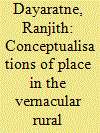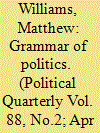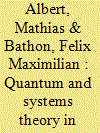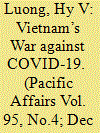| Srl | Item |
| 1 |
ID:
100034


|
|
|
|
|
| Publication |
2010.
|
| Summary/Abstract |
It is well known that traditional communities relate to their settlements differently from modern ones, and that in the developing world contemporary settlements often constitute dualistic communities, holding contrasting perceptions of place. Sri Lanka's traditional communities have been fashioned by historically evolved conceptions of the world comprised of supernatural beings and their interrelationships; reverence for nature and spirits underpin everyday activities and life expectations. The monks and peasants who were the main occupants of such villages articulated their conceptions of place around the duality of the sacred and the profane, a mode of conceptualisation still embedded in everyday language and behaviour. The paper elucidates the structure and the conceptualisations of the significant places in traditional Sri Lankan villages. It discusses how they have become, with globalisation, diffused, yet remain at the core of local conceptualisations.
|
|
|
|
|
|
|
|
|
|
|
|
|
|
|
|
| 2 |
ID:
153297


|
|
|
|
|
| Summary/Abstract |
Legislative language is a crucial, yet somewhat overlooked element of British politics. So how has the language of British legislation changed over the past century? For this study, all 191,080 pages of legislation enacted between 1900 and 2015 were assessed for changes in the quantity of legislation, and 5,878 sections of legislation from 1920 to 2015 were analysed for changes to the quality of language. Parts of speech that affect the subject, object and verb of sentences were recorded, giving a novel long-term study of indeterminacy in legislative language. Findings show that interpreting legislation became increasingly dependent on circumstance and discretion after the war. Change further accelerated after 1975. This reflected a widening gap between public demands placed on government power and the difficulties faced in accommodating these demands.
|
|
|
|
|
|
|
|
|
|
|
|
|
|
|
|
| 3 |
ID:
175129


|
|
|
|
|
| Summary/Abstract |
This article provides a sympathetic, yet also somewhat critical, engagement with the notion of ‘quantizing’ by exploring substantive overlaps between quantum and systems theory. It is based on the observation that while quantum theory is ‘non-classical’ in its entire world-view, there is a danger that when it comes to the social world it is simply laid on a world-view of that world, which remains at its core ‘classical’. This situation calls for engaging quantum with existing non-classical social theories. Resemblances between quantum and systems theory are obviously given through similarities around the concepts of observation and meaning, whose status and function in both bodies of theory is explored. We then probe the degree to which obvious analogies in fact could be read as overlaps and similarities that could be put to complementary analytical use: in a sense, we argue that systems theory ‘does’ quantum theory, and vice versa. The article concludes with some vistas of this discussion for the field of international relations.
|
|
|
|
|
|
|
|
|
|
|
|
|
|
|
|
| 4 |
ID:
187421


|
|
|
|
|
| Summary/Abstract |
Vietnam effectively controlled the COVID-19 pandemic until April 2021, and faced great challenges afterwards, partly due to the spread of the highly transmissible Delta and Omicron strains of the coronavirus. Adopting Joel Migdal’s “state-in-society” approach, this article focuses not on the impact of regime type, but on the fear-driven tension and the process of negotiation among different levels of the state apparatus and between state and society during the COVID-19 pandemic in Vietnam. The evolution of this pandemic was shaped not only by state measures but also by citizens’ fear-driven situational variation in norm compliance, as well as by the historical and cultural backgrounds of a society, specifically the wide sharing of war experiences and the war metaphor in Vietnamese society, and the non-negative meaning of face masks in daily life.
|
|
|
|
|
|
|
|
|
|
|
|
|
|
|
|